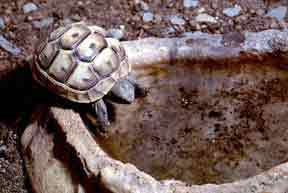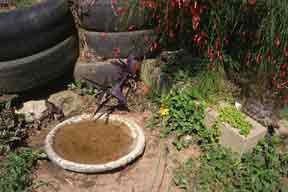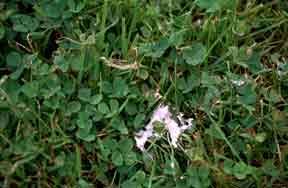
![]() TORTOISES: Do They Need To Drink ?
TORTOISES: Do They Need To Drink ?

A.C.Highfield

There is a considerable amount of misunderstanding on the subject of the water requirement of tortoises. This is unfortunate, as a number of pathological conditions are directly related to the availability or otherwise of environmental water, and to the general hydration status of reptiles such as tortoises.
The most common health problems associated with a sub-optimum level of hydration or prolonged period of environmental water deprivation include an accumulation of solidified uric acid in the renal system and bladder; articular gout; and kidney failure. All of these are extremely serious conditions and it should be noted that dehydration, even for short periods, can have grave long-term consequences.
Many people seem to believe that Mediterranean tortoises naturally acquire almost all of their fluid requirement from their food and that therefore they do not require additional drinking water. One recent book on Mediterranean tortoises even suggests that only sick tortoises voluntarily drink fresh water*. It is highly regrettable that such dangerous misinformation is in circulation. This latter contention is simply not true, as direct observations of Testudo graeca and Testudo hermanni in the wild all too easily confirm. Both species are at their most active during or just after episodes of rain, and can be observed to 'nose' along the ground, drinking from any available puddle. Tortoise Trust field trips have resulted in a number of observations of this kind. In Spain, France, Italy and Greece wild Testudo hermanni have been observed in some numbers to drink rainwater and to increase their activity level during wet weather, especially during summer thunderstorms, when the rain brings welcome relief from the searing heat and aridity of summer. In North Africa and Spain (T.graeca), Greece and Turkey (T. ibera), tortoises have been observed drinking from the edges of streams, from reed-beds and from puddles during episodic rain. Recently in Morocco, following the heaviest rain for many years, tortoise activity was as high as I have ever seen it and numerous individuals were observed drinking from surface water. In many arid regions, tortoise activity ceases entirely during summer or in extended periods of drought, and only resumes when rain returns. In southern Turkey, Spain and Morocco, tortoises aestivate during summer because food and water availability is so poor. In southern Africa it is commonplace to see Geochelone pardalis (Leopard tortoises) drinking from streams and pools, and recently Moll and Klemens reported on the utilisation of standing water pools by Malacochersus tornieri (pancake tortoises) in Tanzania.
Mediterranean tortoises are indeed adapted to withstand a semi-arid environment. Their system of eliminating waste via uric acid rather than via urea is clear evidence of this. Uric acid can be eliminated using far lower levels of water 'wastage' than can systems based on urea, such as those of mammals and amphibians. It is also significant that species from damp environments such as rainforests, e.g. Geochelone denticulata, feature a very different urinary biochemistry than do species from more arid environments such as Testudo graeca. In the former the ratio of excreted uric acid to ammonia is 6.7:6.00 and in the latter it is 51.9:4.1!

All pens should include easy access to fresh, clean water
Mediterranean tortoises can therefore eliminate nitrogenous waste products with very great water economy. Their behaviour is also programmed to reflect this need not to waste precious water. It was noticeable that during the rainy period experienced in Morocco just a few months ago many traces of uric acid deposits were in evidence as tortoises urinated while they drank. In an arid environment it pays not to dispose of vital body fluids unless you can be sure of replacing them! I am sure this behaviour is also familiar to many pet tortoise keepers.

The semi-solid, white deposits of expelled urates. Tortoises are 'programmed' not to use water in the bladder to eliminate these unless replenishment is available. Depriving the tortoise of water will result in urates being accumulated - often to dangerous levels.
During a summer rain tortoises will often drink and urinate simultaneously. The behaviour can be stimulated in hot weather by lightly spraying the animals with a garden hose. Your tortoise is not sick if it behaves in this way. It is behaving exactly as its wild counterparts would and for a very sensible and biologically sound reason.
Just because they are able to tolerate water deprivation for a substantial period is not reason to deprive them of it deliberately or permanently. Water deprivation is a sub-optimal state which, if extended beyond certain limits, results in serious health problems. Food alone is not normally an adequate source of the total water requirement of semi-arid habitat reptiles.
We have seen several cases recently in which tortoises reared on the basis proposed, i.e. , no access to fresh water and an expectation that all fluid requirements can be met entirely from food, have accumulated serious concentrations of uric acid in the bladder. This is hardly surprising and is precisely what one would expect from such a regime, given a fundamental understanding of tortoise biology and ecology. In the long term such animals can also be expected to develop kidney disease and articular gout.
In the wild, during hot and rain-free summers, aestivation or semi-aestivation occurs. There are several triggers to aestivation. Lack of food and environmental water are major factors, as is temperature. In Morocco aestivation typically begins when temperatures exceed 29º-30ºC. Peak tortoise activity in the south of Morocco typically occurs in the temperature range 20º-26ºC, decreasing as temperatures rise beyond 28ºC.
During aestivation tortoises maintain themselves below ground, in burrows which exhibit a reasonably stable microclimate. In these burrows temperatures are much lower than those above ground and the relative humidity is very much higher. Combined with reduced (practically zero) activity, these factors result in a vastly reduced rate of fluid loss via exhalation and little or no need to urinate.
The advice of the Tortoise Trust on this topic is very clear. Fresh water should be provided to all tortoises on a regular basis. Even true desert species such as Testudo kleinmanni, Geochelone sulcata and Gopherus agassizii will drink given the opportunity. Our own exceedingly healthy breeding group of T. kleinmanni are provided with fresh water daily, and often take advantage of it. The suggestion that only sick animals drink is absolute nonsense and is unsupported by any ecological, biochemical or veterinary study we have been able to trace. There are, however, literally dozens of readily available reliable and authoritative references which support the opposite view.
* Mediterranean Tortoises by Brian Pursall, TFH Inc.